Plot and Setting
The protagonist Hawke's personal choices and plight play a role in the story, and these are delivered well enough such that the dialogue can evoke some emotion in the player. In fact, I'd suggest that the player that goes through the game without some sort of emotional reaction either has a heart of stone, or is simply not interested in investing in their own immersion. Hawke's rise to power plays out through a series of acts, recounted as a story by a dwarf named Varric to a "Seeker" Cassandra from the Chantry - the dominant church in the land of Thedas. Varric's recounting of the story happens infrequently enough that it doesn't feel as though it has much of an impact on the game overall, but it does allow BioWare to "skip the boring parts" as it were, and jump the story forward a year or three. However, these interludes also serve to frustrate instead of entice because Cassandra's allusions typically relate to events that the player is not aware of, and will not understand until a lot later. Thus any tension or curiosity that might have been inspired by her words when they were initially delivered has long been lost. Unfortunately, despite the way that BioWare lauded this "framed narrative" technique, their implementation leaves a bit to be desired and in the end it feels as though DA2 might have been better without it.
Cassandra's inquisition comes across a little flat
The game sees Hawke's rise to power in the city of Kirkwall, in which Hawke arrives a beggar and eventually becomes a powerful champion. The Qunari (a race of giants who have a rigid society), the Chantry, and the plight of mages (who are locked up by the Chantry) all feature heavily throughout the game and you'll often find yourself questioning what is the "right" option. For those who found DAO a little too black and white, DA2 is refreshingly grey. Even better, it's grey without the overwhelming bleak and depressing overtones of The Witcher. If you find yourself being able to respond to choices without question or without hesitations, I'd contend you're either metagaming, or playing a character with an unbelievably rigid and narrow sense of morals. This is a game where you can get choices that will (or at least should) seriously make you think about the situation and hand and the full moral ramifications of your choices. Choosing between, life, death, imprisonment, sanctioned murder, or letting someone commit suicide is not uncommon. The themes covered in the game have some real weight to make the game a meaningful experience that give the player pause for thought and not just their character.
This tends to be the primary focus of the extension of the existing world from DAO, and unfortunately much of the other lore is recycled from the first game. Many codex entries from the first game reappear with little to no modification, which is fine for new comers, but for the old players who are looking to learn more about the world and the setting, you begin to feel a little short-changed after a while. There are some concerns with some undesirable lore inconsistencies between the two games and the content with in DA2, suggesting that a little more care should have been taken, but arguably many of those points aren't going to be noticed except by people interested in it. The reappearance of a few old characters, or mention of your Warden's actions from the original game was a welcome piece of continuity for a player's own personalised experience, except for the many trivial cameos. Some of these unfortunately reek of fan-service rather than serving to enhance the development of the world, but there are some notable exceptions that are well-written characters.
The core of the stories within the game are fantastic, but you really do get the sense that everything in the city of Kirkwall is focused on Hawke and Hawke's immediate mission and concerns. This breeds a lack of atmosphere that makes the world feel less rich than it should be, which detracts slightly from an otherwise superbly crafted experience.
I started here, then the world began to revolve around me
Another minor complaint is the new variant on the much loathed "quest board" of DAO (which also make a minor reappearance). The new style sees you acquire an item and then simply deliver it to the intended recipient, but I really don't feel that it's much improvement. A filler fed-ex quest is still a filler fed-ex quest, and while removing the first tedium of accepting the quest in the first place is welcome, it still feels like a cheap way of "extending" playtime by rewarding simple deliveries. I understand the need for the designers to reward the "explorer" player and reduce the quantity of meaning trash loot, but it feels a little unsatisfying to magically know which person in or around Kirkwall wanted their lost rum/book/shawl/cat/medieval toaster. There are a few quests that rely on you visiting a time during the day or the night, but the game uses a great mechanic whereby you can select day or night. There's no need to rest or wait, you go to the map and select day or night, and then the desired area. Thus the player gets the feel of dynamic world you explore in day and night without the associated inconvenience of timing hassles, nor the technical and performance impact of implementing full 24 hour lighting cycles.
Roleplaying and dialogue
This is one area in which the game excels. In addition to the decisions in which the player can make, conversations feature a lot of roleplaying decisions to give flavour to their interactions. These offer three styles, diplomatic/altruistic, sarcastic/charming, or blunt/aggressive. The viability of playing a character that is neither altruistic nor psychotic is something that has been sorely lacking in RPGs for years. Actually being able to deliberately play as a wise-cracking hero who occasionally does the right thing and occasionally does the selfish thing and not being punished for doing so is superb. While you did three viable conversation style options in Obsidian's Alpha Protocol, the fact that the dialogue writing for Michael Thorton was below their normal standard let that game down. DA2, however, delivers brilliantly in terms of the main character's dialogue. The icon system augments the text brilliantly, and even though you're not picking the exact line you deliver, you almost always know the intent and tone. In this way, it unquestionably outperforms Mass Effect's wheel.
Icons improve the wheel
The conversations are well written, almost universally well-acted, but that the is top-notch work players have come to expect from BioWare. Unlike in DAO, I'm not playing with subtitles on. For me, that is as a high a recommendation of the cinematics, dialogue and voice acting that I can give. The "dominant personality" system where Hawke responds based on your favoured tone (as determined by which of the three roleplaying styles mentioned previously you pick the most) presents a great deal of width in terms of responses. There are times where Hawke was unquestionably speaking with the same sarcastic wit that I'd told her to indulge on a regular basis. This means your character feels like a consistent character, even when you do something that would normally be "different" to your standard approach. In this regard, the roleplaying aspect is superb. As are the consequences and ramifications of the decisions you make, as many later come back to help or hinder you.
The problem is that these choices and the dominant personality combine to provide a great breadth of lines. As a result of that, it feels like BioWare had to cut the amount of "flavour content" present. You are only able to have a decent conversation with your companions in their "base", non plot/quest related conversations are virtually non existent. If you can't have a "proper" conversation with an NPC, it's likely that they'll have a single line they'll deliver over and over. If you're lucky, they might have two. There is some "ambient" dialogue delivered by the populace, but unfortunately it feels a little dreary and emotionless much of the time.
So many people to talk to... and hear one line
Lamentably, one of the largest problems in this area is the lack of communication with your companions. You occasionally get called to talk to them, and some of the discussions you can have with them are fantastic, but there just doesn't seem to be enough of them to necessarily have the deep relationships you develop with them. The game actively encourages the player to use their own imagination to "fill in the gaps" of the conversation you don't see, which was present in DAO to a degree, but delivered more effectively in DA2. However, when you do have conversations writing is much improved, as you don't end up with actual opinions and emotions rather than factual exposition.
Strangely enough, character depth for your companions is one area where the ambient dialogue shines. The amount of banter and comments that party members have seems to be increased significantly over DAO, so the quantity of dialogue is probably about the same, but now it is merely you listening to them rather than talking with them. This is possibly exacerbated by the long first act where the characters are not developed a great deal, meaning that you end up making lots of decisions that they agree or disagree with, but you're not quite sure why. On the plus side, the ability to develop a healthy and respectful rivalry with your companions is a wonderful improvement over the "agree with your companions or they hate you" system that has been used in the past.
She hates me at times, but we still respect each other
Combat
This is one area where DA2 shines head and shoulders above its predecessor. If there were to be an area equivalent to the Deep Roads in DAO, I probably wouldn't fear it as much in DA2, because the combat is just so much more fun. It's fast, action-packed and can all be managed on-the-fly in a slight frenzy that keeps you busy. There's not the tedium of DAO where you could sit there waiting for your warrior/rogue cooldowns to reset, or simply leave hands hovering on the keyboard and mouse while you watched your characters without any stamina or mana slowly beat their enemies to death. Moreover, the pause-and-play aspect is still there, so if you want to ramp up the difficulty, take full control and give yourself a bit of a challenge, then that option is there for you.
Flashy combat doesn't detract from the game
I'd say that the combat is definitely easier on "normal" than it was in DAO. This may be the cause of some of the "dumbed-down" arguments that detractors are flinging at it. That said, if those players desire a challenge, they can always put the difficulty up to nightmare and test their mettle. Giving the players the option to have an action-oriented experience on normal difficulty is not a bad thing. RPGs shouldn't only be for elitists who want lengthy tactical battles for every encounter. Even in the old gold-box games or Infinity Engine games, there were times when you'd just want to fling a ridiculously destructive spell (or two or three) and obliterate the enemies in a single salvo. The ability to have this kind of variety is a good thing, not a bad thing.
The combat system also utilises "cross-class combos" whereby classes can stagger, disorient or make an enemy "brittle", allowing of the other two classes exploit this weakness with a skill to do massive damage. My only problem is that I feel the cross-class combos are infrequent or limited enough that it's not easy to exploit them without conforming to specific party make-ups or character builds. There are quite a few combinations possible, but unless you deliberately choose to pursue character and party builds to create them, you can end up with little ability to have your party work together in a "special" manner until quite late in the game. It's possible that I'm asking for too much here. They also introduced the "commander" mechanic, whereby enemy "commanders" boost the prowess of their minions unless they are disabled (knocked down, stunned or otherwise incapacitated) in some manner. This adds some much needed complexity to DA2's fights, whereby it actually becomes necessary to manage your assault between the tough leader and his/her minions, rather than simply rapidly dispatching all the weaker foes as was possible in DAO.
There are some boss fights or set-pieces that RPG purists people will likely find over-the-top, and to an extent, I agree. That said, taking the complexity of fights from MMOs and translating to the single player experience serves to make the combat more interesting, even if I was torn between thinking how impressive it was and how it had ruined my suspension of disbelief.
That has to hurt
Unfortunately, once the combat is over and you loot, the shortcomings of the loot system can be seen. Sometimes I picked up less coin from a boss than I did his weak underling, and there are far too many cases where you pick up new gear that is inferior to that which you already possess. It's still extraordinarily disappointing to disarm deadly traps and lockpick near-impossible locks and get trash loot. Given the general advancement in combat, the loot needs to be on par.
Graphics
The flippant comments of a CD Projekt Red developer regarding the quality of their graphics compared to Dragon Age and The Elder Scrolls sparked heated debate among RPG fans. The ridiculous thing about these comments is that it's akin to comparing something like Final Fantasy: The Spirits within to a Studio Ghibli film. A stylized art direction does not mean a reduced graphical quality. I'm running on a PC and am utilising the high-resolution texture pack, but I don't have a high-end graphics card, so can't use DirectX 11 on Very High detail, but even on High quality the game still looks very nice.
DA2 is not unattractive, it simply has a style
The bizarre thing is that the stylized graphics are at odds with the effort put in to creating realistic looking facial appearances for characters. Seeing a fully expressive person against the background of the rest of the game is a little like putting a photograph on top of an oil painting. It's the lack of consistency that makes the game feel slightly schizophrenic in appearance, but it's not overly distracting in the scheme of things. The icons for equipment, while keeping with the art style of the ability icons, also fail to deliver. Simple coloured backgrounds and plain and clear armour icons with virtually no variation provide no individual character to the equipment. The varied appearance of equipment makes Hawke look great, and even the individual companion outfits are very nice, but you never know whether that new green background armor is going to look different to your current green background armor.
The real problem that does exist with the graphics is the varying degrees of texture quality. Much like the contrast of realistic faces against a stylised art style, the presence of high resolution textures for the face and some parts of the clothing serve to highlight that weaknesses where the texture resolution is poor. Whenever you talk to a templar, it's possible to notice the varied texture quality on their outfit. Or you ruffled mage robes with varying degrees of texture resolution that just stick out like a sore thumb.
Those shoulders are what doesn't look good
Level design
This has to be undoubtedly the weakest part of the game. From the drab and repetitive appearance of Kirkwall to the almost inexcusable over re-use of areas, you do get the feeling that this particular aspect of design was sadly overlooked. When I saw this interview where David Silverman, the Marketing Director talked about how unnecessary all the books in the Circle Tower in DAO were because they went unnoticed by players, I was a little worried about this aspect of DA2. Unfortunately, some of my fears were realised in a remarkably horrible way.
The lack of clutter and character for levels is very stark, particularly in Kirkwall itself. The vast stretches of plain, unbroken tiles give Kirkwall a staid and stale appearance that the limited number of NPCs walking around cannot overcome. The city of Kirkwall feels very empty and lacking in terms of its population, giving the impression of an empty box for the player to run through. Lowtown and the Docks offer a little more variety in terms of their appearance, not featuring endless tiles off into the distances, but Darktown is the only area that begins to feel like a real environment, though it still lacks the foreboding appearance or atmosphere suggested by its name or the lore surrounding it.
The problem with level design clutter is that you only notice it if it is absent. People NOT noticing the subtleties of level design is typically the hallmark of a good designer, not the mark of wasted time. Many PS3 owners hold up Uncharted 2 as an example of superb graphics, but in many cases what they actually should be commending is the level design. It is not the graphics that make the game look good or realistic, it's the well crafted levels that are filled with all the rubble, rubbish, rocks and foliage that you would expect in the environments the player goes through. Kirkwall in particularly is sorely lacking in this regard, which is a significant problem when you spend so much time in it.
The tiles of Kirkwall. Get used to them, you'll be seeing them a lot.
Area reuse, particularly of interiors, is arguably the worst sin in this aspect of the game. Having areas that are used as part of a core plot reappear to be used for a relatively generic encounter, or worse, having a generic area reused for a pivotal plot, destroys the uniqueness of the experience. This is a terrible shortcoming to have, as the thought "I've been here before" utterly ruins the emotional impact and epic feel of a story's key events. This is unacceptable in almost any game, but inexcusable in a game proclaimed as a AAA title. DAO had some area reuse, but not to the same extent as DA2, and certainly not for key plot areas. The decision to release DA2 with these failings is terribly short-sighted indeed, and should never be repeated again.
The reason that this is so disappointing is that there are some great examples of level design within the game. Quite a number of the exterior levels have a good degree of clutter, provide branches for the player to explore as well as giving "corridors" for a series of encounters. There are levels that are definitely visually appealing and make you appreciate the effort that went into crafting them properly. It is unfortunate that these tend to be the exception rather than the norm.
But thankfully, the rather limited colour palette so heavily infused with brown (which even the characters in the game joke about) in the first game is gone. DA2 is much more vibrant in its colour, and the game is much more aesthetically pleasing because of that.
No more endless Deep Roads of brown
Music and Sound
Given I didn't feel that DAO's soundtrack was Inon Zur's best work, the fact that huge strides weren't made in this area is a little disappointing for me. The main theme still appears to be the pick of the tunes, even though it is reusing parts of the original DAO theme. There are some good original pieces here, but there's not as much musical impact and emotion as I was expecting. Unfortunately, a number of the tracks are even remastered tracks from the original game. While I was playing it felt like that was the majority of the music I was hearing, but there the Signature Edition I bought came with the soundtrack (though I'm unsure if it's the complete soundtrack) of 29 tracks spanning 1 hour and 15 minutes
However, comparing the huge improvements made between the first two titles of BioWare's other flagship, Mass Effect, I feel that DA2 didn't do enough to mature in the music department. That said, the musical cues at important points in conversation and the story do deliver and frequently with significant punch, it's just that outside of these that the music tends to feel a little underwhelming.
The sound apart from that is reasonably good, character and background sounds are fine, although more ambient noise would definitely help to overcome the feeling of emptiness present in many areas. The main problem is that just like the level design in many cases, there's a lack of a deep atmosphere. The richness of sound isn't as strong as it should be, being merely serviceable instead of exceptional.
The sound isn't as rich as the environment
Lastly, I don't know if the lack of music after the game finished and the credits started rolling was intentional or a glitch on my computer, but it left me feeling rather flat to have the game finish with a silent whimper. It might be trivial, but the ending sticks in players minds and can have a significant negative influence on a player's perception of the game if it's badly delivered.
Conclusion
Ultimately, Dragon Age 2 comes across as a flawed masterpiece. It features some very classic influences, but these are blended with more modern sensibilities to try and evolve the single player RPG. What DA2 does, it does it well, but its shortcomings stem from what it doesn't do. It is without doubt a great game and a marvelous roleplaying experience, but is marred by things that players really don't expect to be present in a release from a veteran developer like BioWare. Its various elements combine to make a thoroughly enjoyable game, but in the end, that game leaves you wondering just how good it could have been if its development cycle had been a bit longer.

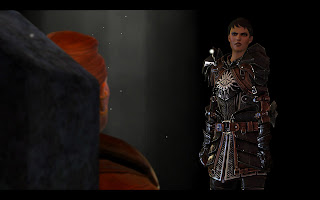
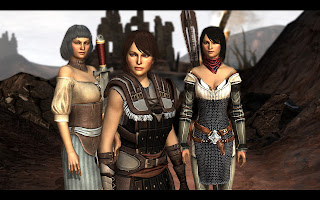
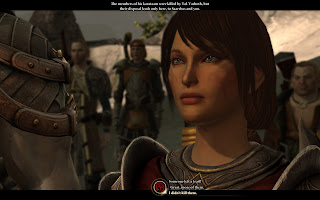

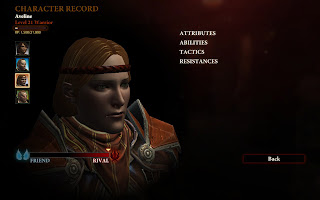
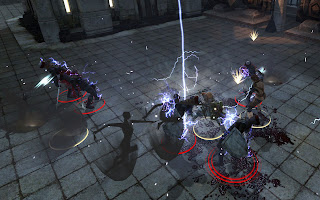
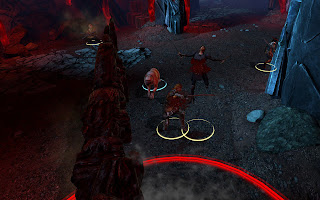
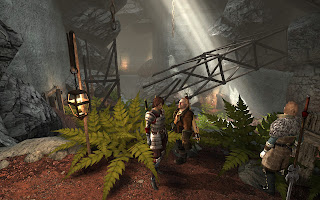


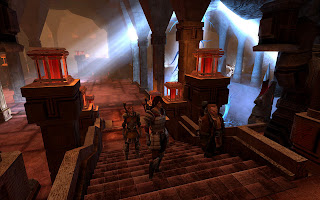
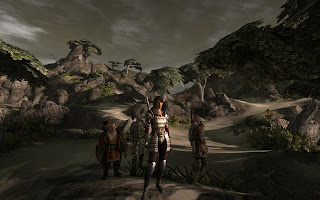



Seems to be some text missing near the "Roleplaying" bits.
ReplyDeleteNice, in-depth review, although I didn't understand a bunch of things because of assumed knowledge which I lacked because I haven't finished the first game, or paid much attention to the previews of the second.
Do you think they may have released it early to clear out the marketing schedule for Mass Effect 3 and The Old Republic?
Thanks for the information - I've modified the start to give more of an introduction to explain some things that might not have been clear.
ReplyDeleteInteresting suggestion about the marketing schedule. It's certainly a possibility. I'm still unsure of the timeframe for The Old Republic, and I'm not sure how much marketing they really need for a Star Wars MMO since they're going to get most rabid Star Wars fans (which there are a lot of) and probably a significant portion of the BioWare fan base (at least the ones who haven't turned away after DA2 because they think it's "dumbed down").
They also could have been aiming to release a game early in the year when there's not a whole lot of competition around to try and grab some of the players who "don't play RPGs", as it's definitely designed to be more accessible for the average player.
The music isn't better because Inon Zur, the composer, said it was a rush job (in answer 4).
ReplyDeletehttp://music.ign.com/articles/115/1154594p1.html
Great review.
ReplyDeleteI think complaints about combat being "dumbed down" are mainly due to the lack of a zoomed out tactical view. Also, the way enemies get on top of you so quickly - and then continue to spawn in waves - makes most encounters seem like chaotic pileups.
I think it's a case of something lost and something gained. The loss of tactical battlefield control is real (but unavoidable if you want faster combat). However, the additional tactics you mention largely offset that loss. The trouble for Bioware is that the game itself doesn't communicate the changes very well, and because it's so easy on Normal, players aren't forced to explore different options to survive (until they get to the Ancient Rock Wraith, that is). Regardless of the actual merits of DA2 combat, I think it's easy to see why it's made such a poor impression.
Kamal: I'm disappointed Inon Zur doesn't even know that orcs do not exist within the world of Thedas. Maybe I'm asking too much of the composer to know about the game world.
ReplyDeleteNemorem: I understand why some people are complaining, but it seems that they are complaining because "it's not DAO"! I feel it's a little like Alpha Protocol in that the actual content of the game didn't match up with their expectations rather than it being bad. It's just different and thus assumed to be bad or stupid.
Anduraga: My sincere apologies but I felt I had to delete your comment for spoilers. I do understand where you are coming from, but for me I felt at least that I was being welcomed as opposed to directly threatened or ostracized, which is what I felt in The Witcher. I'll definitely be interested to debate this at a later date, but not on this no-spoiler post.
I don't think we can stress enough how much the combat has improved over DA:O. I played (mostly) on Nightmare, and found most trash packs were deeper and more tactical encounters than anything short of Harvester in DA:O.
ReplyDeleteHonestly, the fact that the difficulty settings matter at all is one of the most crucial achievements - they were a joke in the first game, but here they profoundly shape the experience. Even little things like adding a small AOE to Winter's Grasp make Nightmare much more thoughtful - I actually cared about friendly fire! The waves of opponents actually made me care about positioning and the level layout!
Furthermore, while I doubt the balance is perfect, and we will surely discover some outliers, the number of viable builds seems to have increased. For a full Nightmare clear I'd expect at least some companion-swapping and respeccing would be necessary. My only complaint there is that some of the most significant challenges are in places where it's not easy to regear or swap party members, making it annoying to experiment with them.
Even after having my hopes raised by the demo I'm very pleased by the extent to which Bioware have improved the game on a system-level in such a short period of time. Given how quickly DA2 has been turned around (which no doubt explains the reuse of level art despite the otherwise very good content of the side quests) it would have been easy for them to put out a mildly improved system, but someone at Bioware has done some really superb system work over the last year or two, and achieved extremely satisfying results.
I just wish there were many more MMO-style bosses to ramp up to the ones we got. I think the game's learning curve is significantly improved, but there's still some abrupt spikes.
It's going to be bloody rough going back to mod for DA:O.
On the story level: this is my favourite Bioware party ever, which is the most important part. I love these guys, particularly the Isabella/Aveline interactions. Otherwise I liked the story in its context of being very focused on Hawke and Kirkwall. In particular the sidequests were largely very well integrated in the story. Unlike DA:O or ME1 where there was a clear distinction between the big main quest stuff and the tacked-on sidequests, I felt like nearly everything I did mattered, and I wasn't just emptying my journal for extra XP/loot/OCD.
Just a quick question: What's the play-hour like with DA:2, assuming you finish all of the side quests? Is it considerably shorter than the 60-or so hours I got in the Origins--which seems to be the impression I get from the magazine reviews?
ReplyDeleteMy recorded playtime from the saves are: Origins 64 hours, DA2, 48 hours.
ReplyDeleteOh, so not THAT much shorter. One of my biggest worry is alleviated--though the area re-use seems very problematic, as I am a fan of immersion. Thanks for your answer--and for sharing your thoughts on this game!
ReplyDeleteThat was an interesting post. I didn't like the game at all and think that Bioware got lost somewhere in the development process, probably because of the extremely short timeline and the publishers focus on making a big buzz around the game (that one they've done very well). In my opinion the music was the best part of the entire game.
ReplyDelete